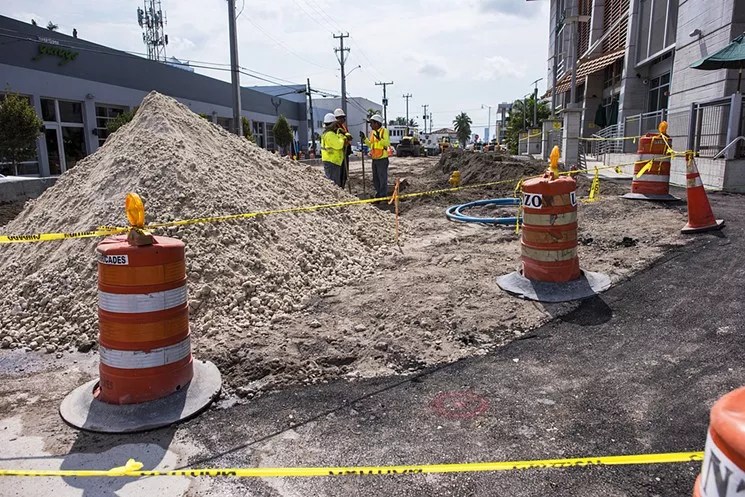
Photo by Karli Evans

Audio By Carbonatix
Early voting begins today, and the City of Miami Beach wants us all to vote for another general obligation bond – a loan proposed by elected officials that uses funds for various capital improvement projects. It’s voted on by residents and paid for, over time, by raising property taxes.
We’re told that in this bond, our property taxes will increase approximately $88 for each $100,000 of taxable property value. The bond is broken up into three parts: $169 million for
Because you’ve mostly heard from the city and groups trying to get the bonds passed without much opposition, I felt I needed to add my 26-year perspective and experience. Many of you have received the glossy “Vote Yes” campaigns in your mailboxes, sometimes daily. There are renderings and flyers at meetings depicting the happy, frolicking children who will enjoy the finished products.
You’ve been fed a lot of positive information. If you hear nothing to the contrary, you might get the impression everyone plans to vote yes for this bad idea.
Let’s begin with the city and its management style. In 1999, the city created the Capital Improvements (CIP) department, designed to handle that year’s $92 million bond projects. The department was formed to deal with a budget 80 percent smaller than the one being
The city hasn’t announced anything about evaluating or reinforcing the department. It hasn’t vetted a team capable of handling a half-billion-dollar fund. It’s completely silent on this important detail. The current team wasn’t designed to handle this $439 million colossus, nor did it perform well on the 1999 bond. It’s been wasteful and unreliable. The City of Miami Beach,
On its Frequently Asked Questions page, the city states that of the 62 projects from the 1999 bond, five were not completed because funds ran out. The city will need an additional $30 million to finish them. Those don’t include another very large, unfinished project: the Flamingo Park Master Plan. That one was left out of this status report. It’s actually six incomplete
Two good examples of the city’s project management failures are the Indian Creek seawall and the floodwater pumps. The first morphed from a $5 million to an $8 million undertaking after the city discovered it hadn’t obtained a permit to rebuild the seawall. Had the project gone through the permitting process, the blueprint mistakes might’ve been caught before the city was so far in. Rebuilding the seawall pieces could cost as much as $800,000.
The other example is the flood pump debacle. No engineer or project manager of our own seemed to think a pump would need a back-up electrical supply. Tropical Storm Emily came and flooded the streets, an outage ensued, and the pumps became useless.
The city needs to do better. Never does it mention during these disasters that it will reevaluate its systems,
We don’t give car keys to adolescents, and we shouldn’t give the city a half-billion-dollar fund. It isn’t prepared. It has done nothing to restructure its CIP department. Without a good project management infrastructure in place, the city is
When the city does reevaluate and fine-tune the project management structure, then it can ask for money. It must first lay the groundwork for this bond – and it hasn’t. This lack of preparation says the city is winging it. As much as I’d like to see my neighborhood projects done, we are not ready to take on a $439 million debt without a good management mechanism in place.
There would be
Pay close attention to the ballot’s bond items. They’re on the last two pages. I hope people don’t get too tired and miss them November 6. Be ballot-ready. Vote no!
Normando Matos is the former Outreach and Awareness Coordinator for the Flamingo Park Neighborhood Association (FPNA).